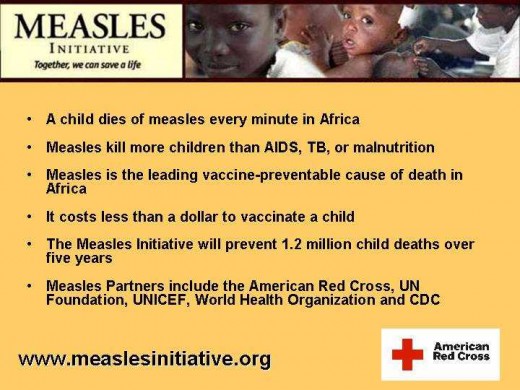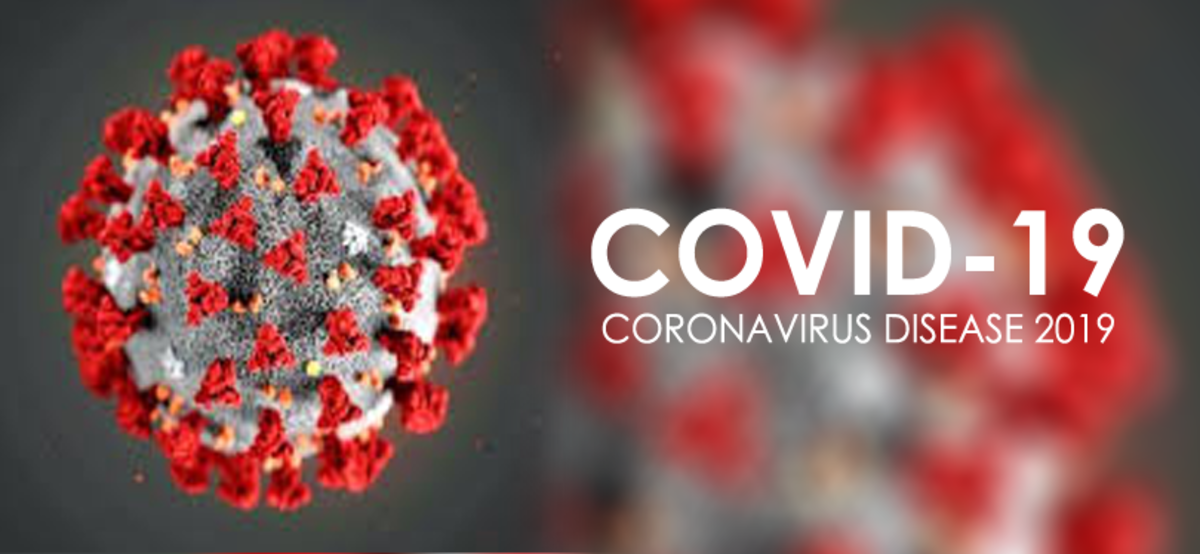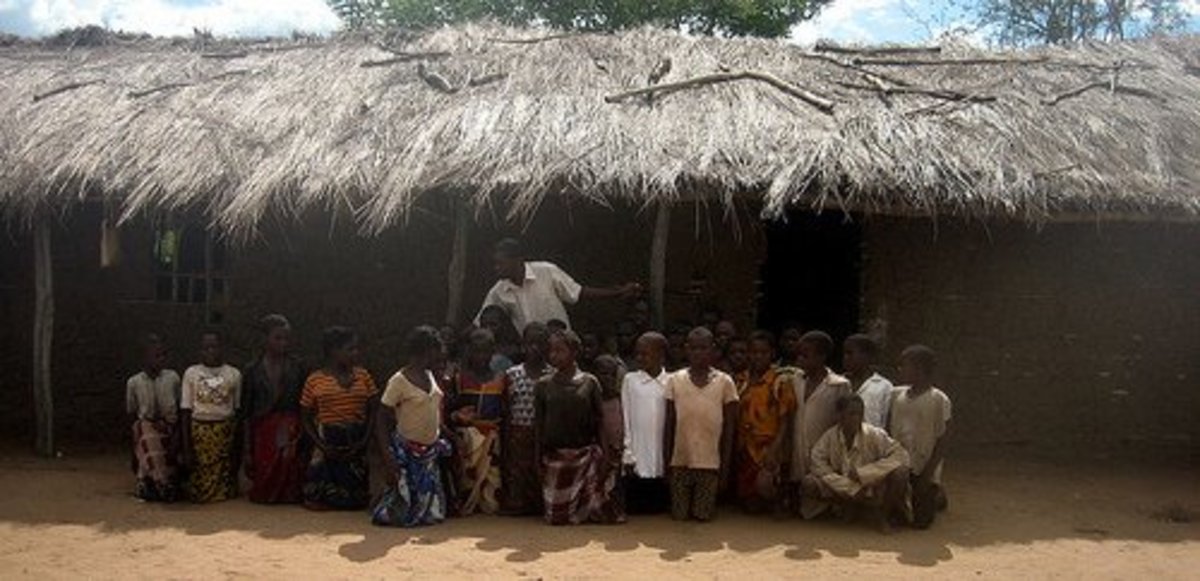Fighting Measles With The Measles Initiative
Measles Initiative- Bangladesh
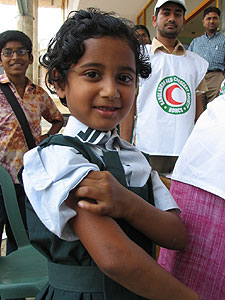
Measles have been a worldwide problem for years.
"Don't count your children until the measles has passed", was a common saying among the Nigerian village Imesi-Ile, in Africa, according to Dr. Samuel Katz, Wilburt Cormel Davison Professor and Chairman Emeritus of Pediatrics at Duke University. Dr. Katz first introduced the measles vaccine to the African people during the 1960's, pioneering this humanitarian effort long before the Measles Initiative was even an idea.
Before this awesome task of providing vaccinations for all people of the world was undertaken, the World Health Organization estimated that between 6 million to 8 million children died annually from measles. Measles was the cause of death for more children than AIDS, tuberculosis, or even malnutrition.
Fighting Measles in Uganda
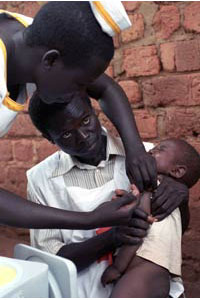
The American Red Cross organized healthcare organizations to develop the Measles Initiative.
It wasn't until February of 2001, when the American Red Cross set up a meeting with several other global healthcare organizations that the idea of global immunizations became a reality. When discussing the growing problem of measles in the country of Africa, they looked worldwide and discovered that measles was certainly a major issue of concern. The tragedy about the problem at hand was that the deaths that occurred due to the disease could have been prevented by a simple vaccination.
The Measles vaccination is the most cost-effective public health intervention available for preventing deaths. The cost of each vaccination is approximately only a dollar per person. In Africa alone, one in every one hundred children dies as a result of measles.
Measles Initiative- Helping children in Niger

Global partnership created the Measles Initiative.
The American Red Cross, UN Foundation, CDC, World Health Organization, and UNICEF are the main contributors to this cause.
The Measles Initiative is the result of this partnership of these healthcare powerhouses. Working together to provide health opportunities world wide, these organizations pooled their resources to form a more concentrated group in this endeavor.
UNICEF- Partners in fighting Measles
Vaccinating Children in Indonesia
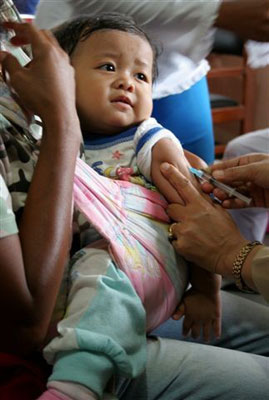
Why are Measles such a problem?
Measles is the most highly transmissible of any of the known viruses. It is spread through respiration, which means, any contact with fluids from an infected person's nose or mouth, or through direct aerosol transmission can spread the disease.
The incubation period is usually 4-12 days, in which no symptoms are visible. Once the symptoms appear the infected individual remains contagious until 3-5 days after the rash appears.
Although the symptoms are commonly a fever, runny nose, red eyes, and a rash, complications such as diarrhea, pneumonia, blindness, mental retardation and other serious complications, as well as death, can occur.
Measles Initiative- Vaccinations are preventative measures.
Measles Initiative- Mozambique
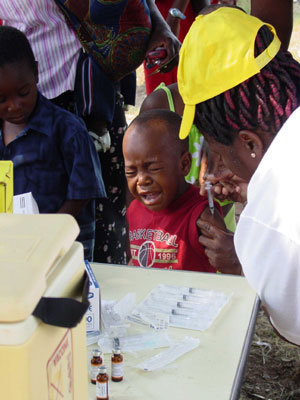
The Measles Initiative will lower the mortality rate considerably by 2010.
The goal of the Measles Vaccination Initiative is to bring the mortality rate to fewer than 100,000 by the year 2010, as opposed to the rate of 900,000 back in 1999.
Dr. Peter Strebel of the World Health Organization believes that the Initiative is successful because different organizations throughout the world have worked with governments to accelerate the control of measles through various campaigns targeting children who have never been vaccinated.
Money and Volunteers are necessary for success.
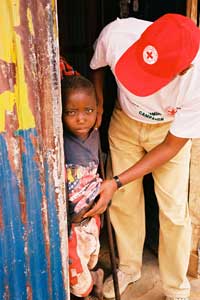
Combined efforts to prevent Measles- Indonesia
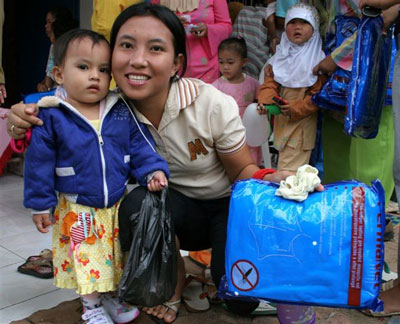
The Church of Jesus Christ of Latter Day Saints is a wonderful partner in this effort.
Besides the well known organizations who work to provide the needed resources to move the initiative forward, many unnamed groups donate time and money to support the larger groups in their efforts.
Included in these smaller groups are the members of The Church of Jesus Christ of Latter Day Saints, the Mormons. According to the Church Welfare Services, more than 54,784 Latter Day Saint volunteers have contributed to this campaign, helping to vaccinate in total, 189,261,345 children in over 28 countries.
Dr. Strebel commented on the help from the church, calling them a "fantastic partner" in the Measles Initiative since 2003.
They have not only donated a large amount of funds, which have been used primarily for the purchase of the vaccines, but have helped with volunteers in distributing the needed immunization.
He stated, "More important than the funding, is the role the Church has played in social mobilization. Mormon volunteers contributed to getting 90 to 95 percent of the children in some areas immunized against measles."
Healthcare is being provided for other areas of concern at the same time.
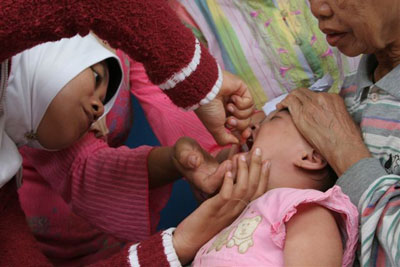
Measles campaigns provide an opportunity to spread love.
In some areas the Church's logo has been added to all the campaign materials because organizers recognized the important service of the local members of the church. Church members actually went house to house, and village hall to village hall, to encourage people to bring their children to be vaccinated.
In 2008, The Church of Jesus Christ of Latter Day Saints will be helping with campaigns in Togo, Papua New Guinea, Ivory Coast, Tanzania, Malawi, Mozambique, Egypt, El Salvador, Honduras, Guatemala and Benin. Many members who have participated have called it "an opportunity for a personal expression of love through service."
Volunteers bring hope through education about measles.
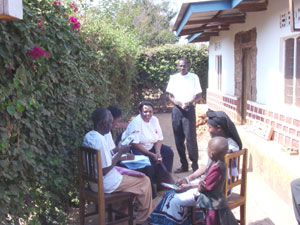
Results and rewards are seen by the efforts of so many wonderful individuals.
The American Red Cross states, "In all our work, we abide by the seven fundamental principles: humanity, impartiality, neutrality, independence, voluntary service, unity, and universality."
Greater humanitarian efforts are yet to be seen on such a wide scale. All who are involved in this effort will truly see the rewards of their participation as they apply principles of service and brotherly kindness in their lives.
